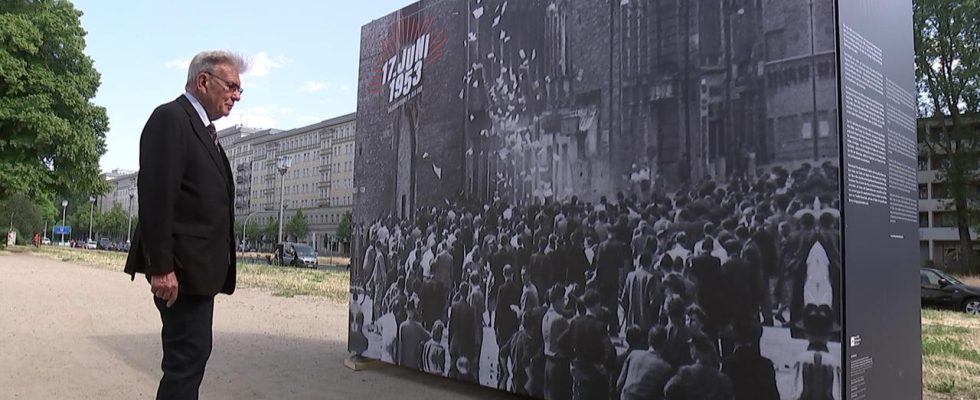On June 17, 1953, citizens took to the streets against the GDR government for the first time. It was to remain the only mass uprising for a long time. Eyewitnesses keep memories alive.
Wolfgang Jähnichen is very busy these days. He is one of not too many contemporary witnesses who can tell what it was like back then on June 17, 1953. Jähnichen, 83 years old, rushes from one appointment to the next: lectures, panel discussions, interviews. He has just arrived at the Georg-Mendheim-Oberstufenzentrum in Oranienburg, Brandenburg.
The auditorium is completely filled, almost 100 students are sitting in front of him, who are now only a few years older than he was then. “Teaching them German history is an affair of the heart,” says Jähnichen with beaming eyes. The popular uprising was 70 years ago and some things he simply no longer knows 100%. Then Jähnichen frankly admits his memory gaps – better than telling “nonsense”, as he says.
Wolfgang Jähnichen experienced June 17, 1953 in Dresden.
Heimlich “Westradio”
Jähnichen begins to talk. About how he – at that time a student in Dresden – secretly listened to “Westradio”, the Allied radio station RIAS. So he knew that “something was going to happen” on June 17. Instead of going home, the then 13-year-old moved to the city center after school on this historic day. Thousands of people are out there. Jähnichen is running, “for sensationalism,” as he admits.
The demonstrators initially demand an end to the “norm increases”: the GDR government had recently decided to raise the working norm. The workers should therefore produce more for the same wages. The state leadership has already reversed this order in view of the simmering resentment among the people – but it is too late. The people’s soul seethes.
A voluntary demonstration
And the young Wolfgang Jähnichen is astonished: Until now, he only knew parades as organized events. For example, if socialism should be celebrated on May 1st. On June 17, everything is different: “It was the first time in my life that I ever experienced a demonstration that was not ordered by the state, but voluntarily.”
It wasn’t long before the crowd chanted much more far-reaching demands: German unity, free elections and the resignation of the government. An embarrassment for the ruling SED. The demonstrators want to free political prisoners, but that fails. At first only the East German People’s Police were there, but then suddenly Soviet tanks drove up. The soldiers only speak Russian.
“The officers shouted something into the crowd, which of course we didn’t understand,” recalls Jähnichen. He and his classmates are still trying to translate – after all, they’ve already had a few years of Russian lessons at this point. It’s no use. The crowd doesn’t give way – instead, shots are suddenly fired: “But – I really value it – not into the crowd, but across the crowd.”
Pictures
The failed East German uprising of June 17, 1953
Shots over the heads and a slap in the face
The crowd disperses. Jähnichen gets scared too and runs away. The workers’ uprising in Dresden is over – as in other cities in the GDR. Across the country, more than 50 people are killed or sentenced to death in the wake of June 17. It will be the last attempt to overthrow the SED regime with mass demonstrations for more than 30 years.
For Jähnichen, this exciting day ends with a slap in the face. His mother gives it to him, completely distraught with worry about where “the Kleene” is going. Politically, his parents’ house had long since ended with the GDR. The social-democratic family had no illusions about what real socialism would look like under SED rule.
Jähnichen was not allowed to study for political reasons and left the GDR before the Wall was built. There he had to do his Abitur again – and was finally allowed to study.
In his opinion, June 17 has often been neglected in the German culture of remembrance: “In the East: You weren’t allowed to talk about it. And in the West: You just didn’t talk about it because you’d rather go on an excursion,” says Jähnichen. Most of his classmates weren’t even interested in why June 17 was a public holiday – and just went happily to the bathing lake, he says.

